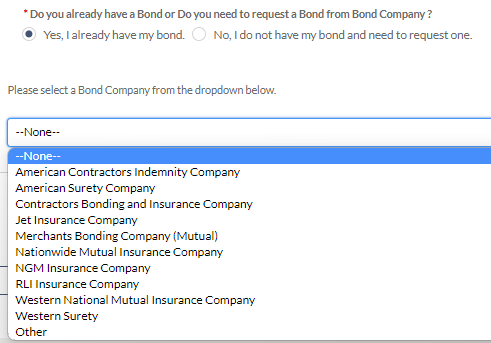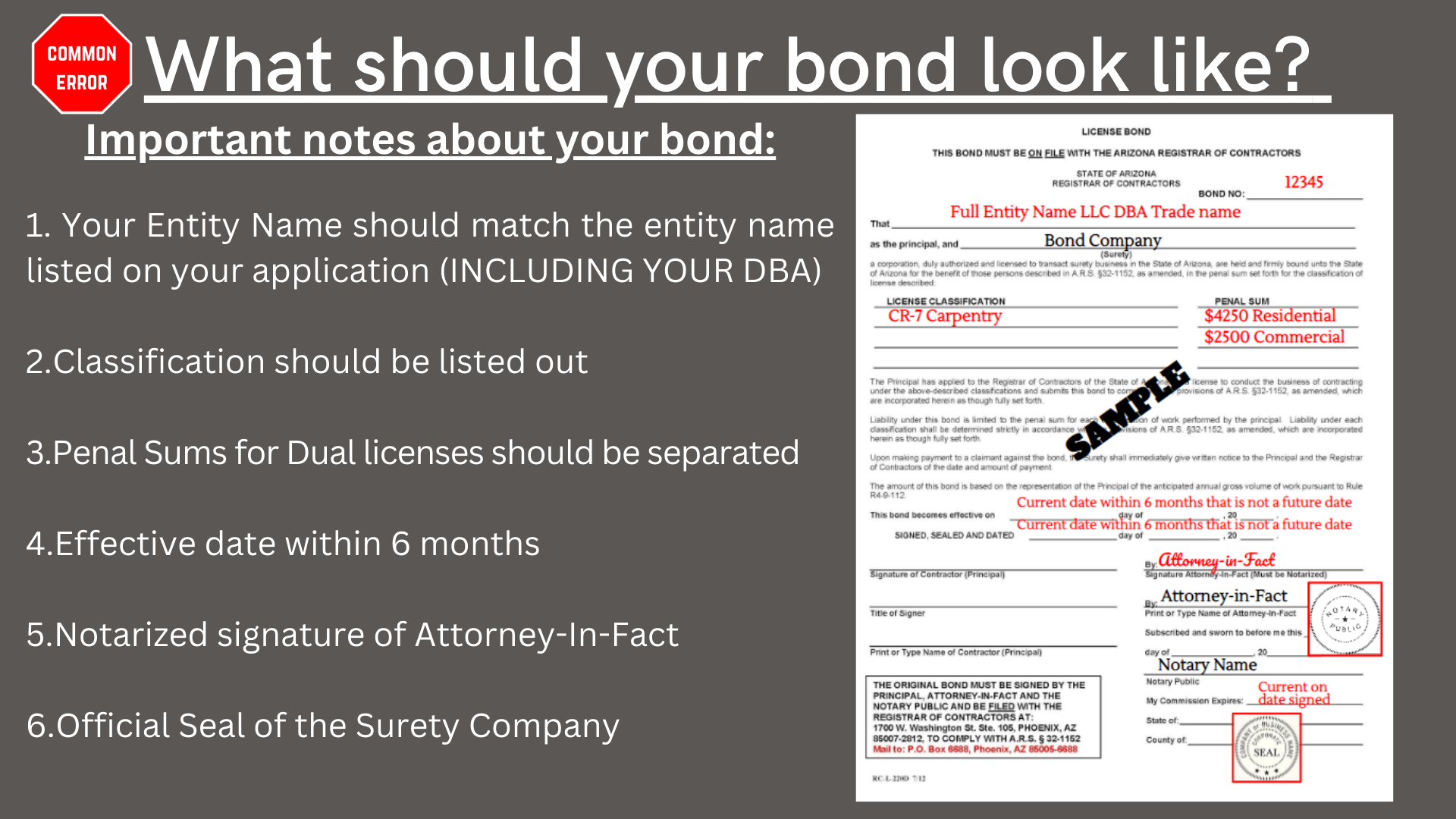Bond Information
Bond Limits and Regulations
Contractor's license bonds are established in the following amounts as based upon the volume of work within the State of Arizona and the classification contemplated by the licensee:
| LICENSE TYPE | CONTEMPLATED GROSS VOLUME (PER LICENSE) | BOND AMOUNT |
|---|---|---|
| Residential General Contractors | Less than $750,000 | $9,000 |
| $750,000 or more | $15,000 | |
| Residential Specialty Contractors | Less than $375,000 | $4,250 |
| $375,000 or more | $7,500 | |
| Commercial General Contractors (Includes General Engineering Contractors) | $150,000 or less | $5,000 |
| In excess of $150,000 but not more than $500,000 | $15,000 | |
| In excess of $500,000 but not more than one million | $25,000 | |
| In excess of one million but not more than five million | $50,000 | |
| In excess of five million but not more than ten million | $75,000 | |
| Over ten million | $100,000 | |
| Commercial Specialty Contractors | $150,000 or less | $2,500 |
| In excess of $150,000 but not more than $500,000 | $7,000 | |
| In excess of $500,000 but not more than one million | $17,500 | |
| In excess of one million but not more than five million | $25,000 | |
| In excess of five million but not more than ten million | $37,500 | |
| Over ten million | $50,000 |
Dual license bond amounts are calculated by combining the amount required for residential and commercial.
Bonding Requirements FAQ

Click on questions to see or hide answers.
- Are there any bond requirements for a contractor's license?
Yes. It is the applicant or licensee's responsibility to file a Contractor's Bond in the amount required for the respective license classification and anticipated annual gross volume. (Please refer to the table here: What will the bond amount be?) The bond may be in the form of a surety bond or a cash bond. You may also provide a bond in the form of cash or a certificate of deposit from any bank which operates in Arizona.
Additional information on bonding requirements is provided in the license application packet or within the Portal (if applying online).
In addition to a license bond, a residential contractor is also required to pay an assessment into the Registrar's Residential Recovery Fund or post a surety or cash bond in the amount of $200,000. - Where do I get a Surety bond?
Per A.R.S. § 32-1152(D), surety bonds must be obtained by a corporation duly authorized to transact surety business in the State of Arizona.
One of the many benefits of using the Registrar of Contractors' Online Customer Service Portal is that, if a surety company is associated with the bond portal, it can conveniently upload your bond directly to the portal, which helps to limit mistakes. If you are applying for a new contractor's license through the Online Portal and are using a surety bond company associated with the portal, you will need to purchase the bond from them before you can submit your completed application. The bond company will then be notified to add your bond to your application when it has been submitted.
Alternatively, if you obtain your bond through a surety company not on the list below, you may upload your bond manually during the portal process.
This is a screen capture from our online application's bond information section showing the drop down list of bond companies with access to our online portal. - How long is a bond valid?
The bond must be continuous. This means that there is no termination date on the bond. You may be required to pay premiums to the insurance company periodically to keep the bond in force. The bonding company has the right to cancel the bond but must send a notice to you and the Arizona Registrar of Contractors thirty days prior to the cancellation date. If this occurs, you will need to replace the bond or your license will be suspended.
If your bond is in cash, the agency will retain the bond until two years after the license terminates. If no claims are made against the bond in that time, you may apply to have the bond released to you. - What will the bond amount be?
Please check the chart below. Determine the bond amount by considering the volume of work and classification contemplated by the applicant.
- Can the bond amount be increased?
The amount of the contractor's license bond may be increased at any time. However, a surety bond or cash deposit in lieu of bond cannot be decreased except at the time of renewal for the ensuing fiscal year.
- When will the bond be effective?
Surety bonds or cash deposits shall not become effective until filed with the Registrar's office. If the effective date shown on the bond is after the date of filing with the Registrar, then that date shown on the bond shall be the controlling date for when the bond becomes effective.
- Sample Bonds
Bond Example for a Sole Proprietor
Bond Example for an Entity With DBA
Bond Example for an Entity Without DBA
